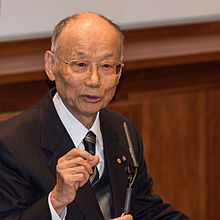Satoshi Ōmura
Satoshi Ōmura ( Japanese 大村 智 , Ōmura Satoshi ; born July 12, 1935 in Yamanashi Prefecture ) is a Japanese biochemist and Nobel Prize winner . He is known for the discovery and development of various pharmaceuticals originally found in microorganisms.
Life
Ōmura studied chemistry at Tokyo University of Natural Sciences , where he graduated in 1963 and received his doctorate in pharmacy in 1968 and chemistry in 1970. From 1963 he did research at Yamanishi University and from 1965 he was at the Kitasato Institute in Tokyo. From 1990 to 2008 he was its president. He has also been a professor at Wesleyan University since 2005 .
He is known for developing new techniques in the cultivation of bacteria and fungi (such as the avermectin- producing bacterium Streptomyces avermetilis and its gene sequencing) and techniques for the search for new drugs among the metabolic products of bacteria and fungi and their biosynthesis. In particular, he is known for researching and developing antibiotics made from macrolides (such as avermectins). Avermectin and its derivative ivermectin became a very successful remedy against worm diseases and other parasites (an anthelmintic against nematodes and ectoparasites such as lice and mites), which are particularly common in the tropics . It is used as part of a program of the World Health Organization to combat onchocerciasis (river blindness).
He discovered over 400 biologically active substances, including antibiotics (such as the erythromycin derivatives) and enzyme inhibitors (such as the protein kinase inhibitor staurosporine ), some of which led to novel anti-cancer drugs, veterinary drugs and pesticides.
As a hobby he plays golf and is a ski hiker and dedicates himself to calligraphy . He is a well-known patron of Japanese art in Japan.
Honors
In 1997 he received the Robert Koch Medal . He also received the Charles Thom Medal from the Society for Industrial Microbiology , the Prince Mahidol Prize in Thailand, the Nakanishi Prize from the Japanese and US Chemical Societies, the Ernest Guenther Award (2005) from the American Chemical Society , the Tetrahedron Prize (2010), Person of Special Cultural Merit (2012), the Hamao Umezawa Prize from the International Society of Chemotherapy , the Japanese Academy Prize, the Canada Gairdner Global Health Award (2014), and the Nobel Prize in Physiology or Medicine (together with William C. Campbell and Tu Youyou , 2015), the Order of Culture (2015).
He has been co-editor since 1973 and editor of the Journal of Antibiotics since 2004 .
He is a member of the Japanese Chemical Society, the American Society of Biochemistry and Molecular Biology and the Royal Society of Chemistry, as well as the Leopoldina , the National Academy of Sciences , the European Academy of Sciences, the Chinese Academy of Engineering , the Académie des sciences and the Japanese Academy of Sciences .
In 2007 he became a Knight of the Legion of Honor in France.
Fonts
- Editor: Macrolide Antibiotics: Chemistry, Biology and Practice . 2nd edition, Academic Press, 2002
literature
- Klaus Koch: Robert Koch Medal for Satoshi Omura. In: Deutsches Ärzteblatt. Volume 94, Nos. 51-52, 1997, pp. A-3462 / B-2812 / C-2534, digitized
Web links
Individual evidence
- ↑ Member entry of Satoshi Ōmura (with picture) at the German Academy of Natural Scientists Leopoldina , accessed on July 15, 2016.
| personal data | |
|---|---|
| SURNAME | Ōmura, Satoshi |
| ALTERNATIVE NAMES | 大村 智 (Japanese) |
| BRIEF DESCRIPTION | Japanese microbiologist and biochemist |
| DATE OF BIRTH | July 12, 1935 |
| PLACE OF BIRTH | Yamanashi Prefecture |
